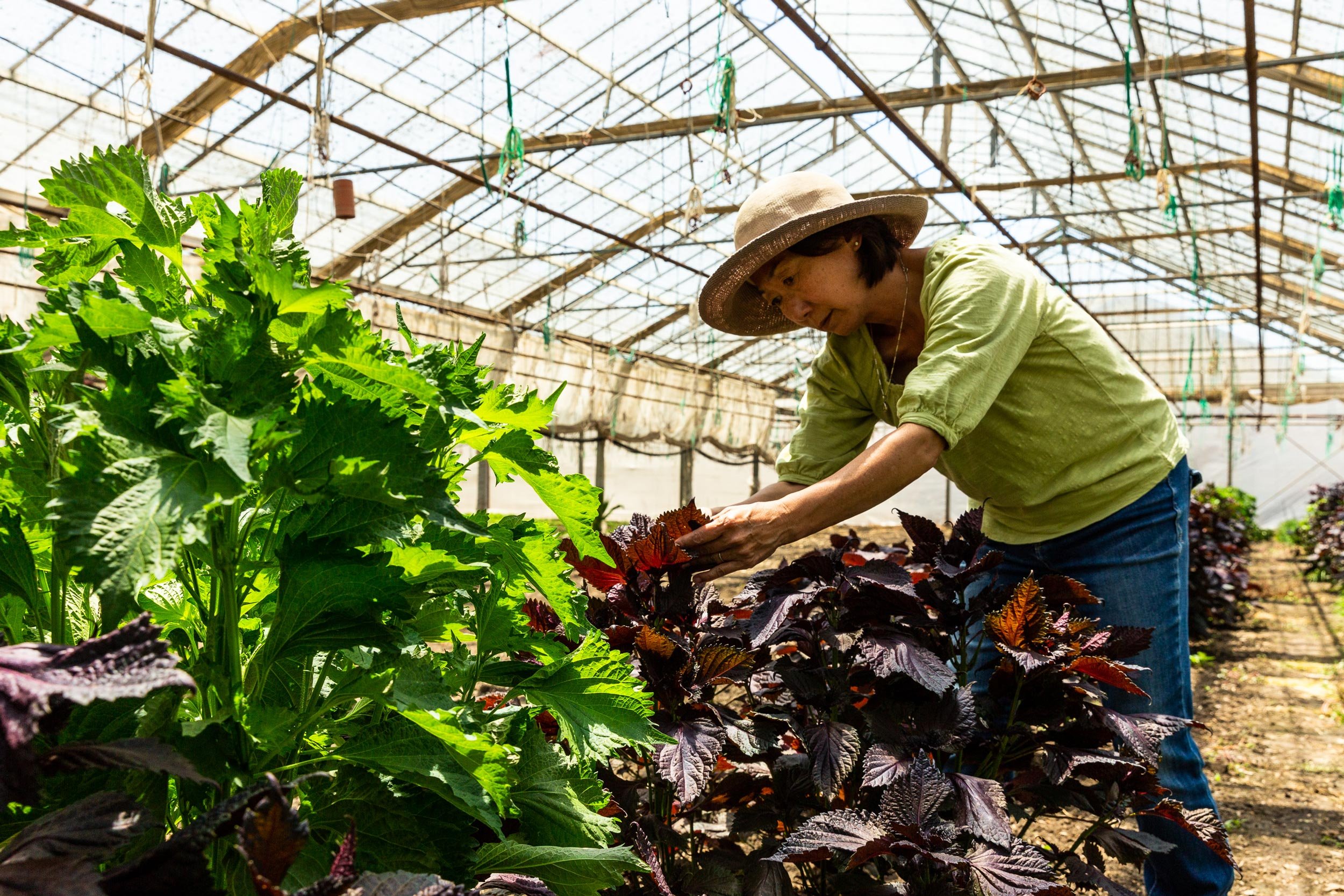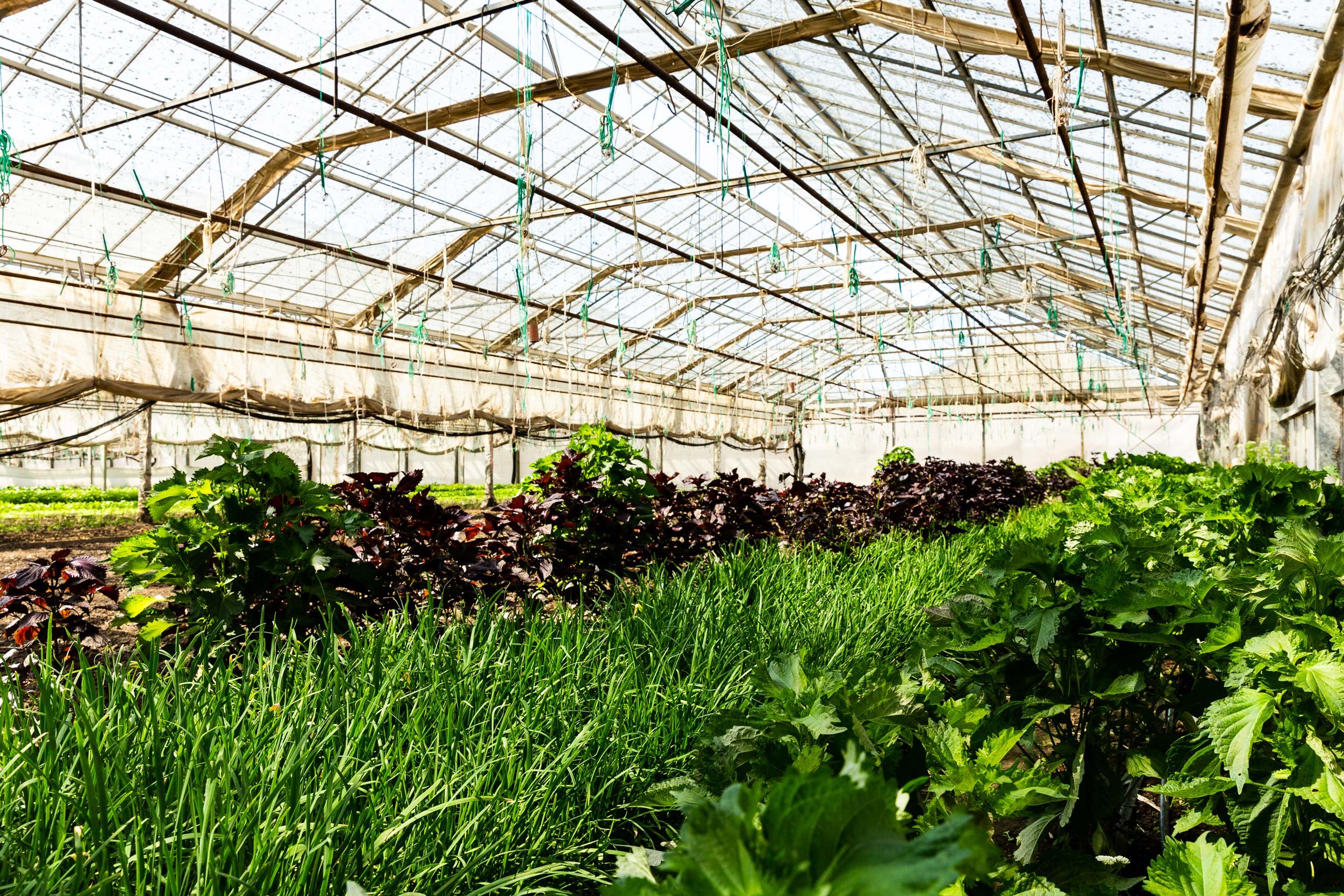With a Little Help, a Family’s Legacy Lives On at Hikari Farms
Guided by the non-profit Kitchen Table Advisors, Hikari Farms specializes in the same crops grown by generations of the Nagamine family in Japan.
Akira Nagamine had just $24.32 in his pocket when he and his wife, Hideko, moved from Japan to the United States in 1956. They had a 30-month contract to pick strawberries in the Pajaro Valley, so they settled in Watsonville — a patchwork of farms, nurseries, and orchards along the Central Coast.
Hailing from a long line of farmers, Mr. and Mrs. Nagamine came to California with a family heritage deeply rooted in agriculture, and plenty of valuable farming knowledge passed down from past generations in Japan. The Pajaro Valley, with its small family farms and a strong sense of community, was something akin to home.
When there were no strawberries to pick, the Nagamines found work pruning orchards. By 1962, they had saved enough to buy five acres of land, pooling their money with Akira’s brother and Hideko’s brother to start a nursery. The business eventually split three ways, with each family member getting their own piece of the pie, and in 1967, Mr. Nagamine opened his own specialty flower operation: A. Nagamine Nursery.
The Nagamines raised their family in this small community, earning enough money from farming to send their kids to college. One of those kids, Janet, went to medical school and became a doctor — a successful career in her parents’ eyes, and one far removed from the rough-and-tumble life of a farmer.
The Pajaro Valley started to change while Janet was away at school. Beginning in the early 1990s, local farmers, including the Nagamine family, struggled to compete with a flood of cheap flowers imported from South America. By the end of the decade, her father had transitioned their greenhouses to grow certified organic vegetables instead.
As the Nagamines struggled to hold onto their farm, so did other families. Janet fondly recalled running around Watsonville with a crew of “farm kids” when she was growing up. Now, those kids seemed few and far between. The average size of a farm in Santa Cruz County more than doubled between 2002 and 2012, from 70 acres to 150 acres. Large-scale operations were buying up land family farmers could no longer afford to keep.
In 2014, Mr. Nagamine was finally forced to shutter his nursery. Janet returned home to help with the somber task of preparing the land to be leased. Mr. Nagamine watched day after day as 52 tons of scrap — mostly old flower equipment — were hauled from the property. Nearly 60 years after coming to America, his dream and his livelihood were slipping away. Once the land was leased, it would all be gone.
Farming No Matter What
The Nagamines never entertained selling but struggled to find suitable partners to lease their land — let alone someone who would steward and care for it as they had. The greenhouses were mostly empty, except for a few share crops grown by friends. Now almost 90 years old and with the potential lease of his land looming, Mr. Nagamine wasn’t about to stop farming, so he started planting cucumbers.
“You can’t keep these guys down — they love to farm,” Janet said of her father and his crew. “It’s not a job, it’s who they are.”
Mr. Nagamine farmed according to his family traditions. He’d plant cucumber seeds in starter trays one-by-one with chopsticks. After transplanting the seedlings, he’d water them row-by-row, plant-by-plant, using a hose with bark wrapped around the nozzle so just the right amount of water dripped into the soil. As the vines grew, Mr. Nagamine kept them trimmed and manicured. When the cucumbers and other crops, like daikon and rakkyo (Japanese scallion), were ready to be harvested, Mr. Nagamine picked, cleaned, and packaged them with incredible attention to detail. Every stage of the process was a labor of love — just as his family had taught him back home in Japan.
Janet couldn’t ignore what was happening. The more time her father and his crew spent in the greenhouses, the happier they were. “They came back to life with the plants,” she said.
Suddenly, leasing the farm wasn’t so simple, even if it was the easiest solution. “I don’t want people putting cement on this beautiful soil,” Janet said, lamenting what would have become of the old nursery had they leased it to the highest bidder. So she did what she had to do to keep her family’s dream alive. She stopped practicing medicine full time and became a farmer.
The Early Days of Hikari Farms
“Nobody was ever anything but a farmer,” Janet said of her family, so maybe it’s unsurprising that she ended up becoming one, too. But it wasn’t an easy path, even if it did come naturally. She had to be the CEO, CFO, and delivery driver when she started — all while learning on the job.
When we visited Hikari Farms in July, she told us a story from her early days working at the farm. She was dropping off produce at a restaurant in San Francisco one morning, struggling to balance flats of radishes while fumbling with a locked door. An employee inside noticed her. Rather than offering help, the employee shouted, “service entrance!” and motioned for Janet to head around the side of the building. Once her morning deliveries were complete, she donned her white lab coat and headed to the hospital to work her regular shift. The respect she was shown the second she walked in the door was a far cry from the way she was received at the restaurant.
"This experience really opened my eyes,” Janet said. “I felt both disappointed in how people are treated as well as blessed for the education and options that I have, thanks to my parents."
Restaurants like that one were an important part of the business — chefs wanted the beautiful organic vegetables Hikari Farms produced, everything from edamame to radishes to Asian greens, like wasabi arugula. “Chefs sometimes freak out when they can’t get our cucumbers,” Janet said. Their produce started popping up in Bay Area grocery stores, too. Things were looking up.
Janet started to recognize Hikari Farms’ potential. She was even having a little fun. At the same time, she had no financial or business experience, and the competition from large farms in the Pajaro Valley and throughout California was fierce — especially from conventional growers who could undercut her prices. If she was really going to do this, she needed a partner.
Working with Kitchen Table Advisors
Janet and her family don’t need much advice when it comes to growing delicious organic vegetables, but operating a successful and profitable farm is a different matter entirely. It’s something small farmers often struggle to do, regardless of how delicious their crops taste. So Janet turned to the non-profit Kitchen Table Advisors (KTA) for help after a board member, who was also a produce buyer at Bi-Rite, encouraged her to apply.
“I don’t think I would have committed to farming without a coach to help navigate,” Janet said. “I needed convincing that I can and should continue.”
KTA helps sustainable small farms and ranches build thriving businesses through in-depth, one-on-one business advising and financial management, and by helping them access capital, markets, and land. Help like this can be life-changing.
Janet worked closely with KTA advisors David Mancera and Noelle Fogg Elibol for three years as she grew Hikari Farms into a financially sustainable operation and continues to work with them on an as-needed basis. They helped her figure out big problems, like the ROI and cash-flow impact of a new greenhouse house roof that cost $90,000. They urged Janet to be objective and analytical despite all the doom and gloom she faces as a small farmer. They convinced her that buying heaters and fans to better control the climate in her greenhouses was a smart investment. And they opened the door to resources Janet didn’t even know existed, like a $50,000 loan from the Farm Services Agency. They also served as cheerleaders, giving Janet the confidence to plow ahead, despite the inevitable challenges on the horizon.
“You can do this and it’s not a gamble,” Janet said, describing what it feels like to have that type of guidance and support.
Both David and Noelle said Janet, who is now a KTA alum, was a quick study.
“It is an honor to work with Janet and support Hikari Farms as a community anchor for healthy food and cultural heritage,” Noelle said. “Janet moves with bravery and grace through the daunting work of adapting her family's farm to the 21st-century marketplace and revitalizing decades-old infrastructure, while maintaining her deep commitment to community and people.”
Ready for More Challenges
Today, under the guidance of Janet, and with the help of KTA, Hikari Farms specializes in the same crops grown by generations of Nagamines in Japan — from fresh edamame, to daikon, to negi (green onions), and rakkyo scallions.
After walking through the greenhouses with Janet, David, and Noelle, we joined Mr. and Mrs. Nagamine for a hot-pot lunch. They’re both in their nineties, but they still help out on the farm. We laughed with them while eating freshly picked komatsuna and mizuna greens wilted in broth with chicken, tofu, and daikon slurry. Pickled cucumbers and kabu turnips, which Janet may sell in the future, rounded out the meal.
Hikari Farms has come a long way in the last five years, but Janet is the first to admit that she still has plenty to figure out. With farmland in the area valued so highly, especially compared to the income crops can generate, the temptation for small farmers to sell or lease their land is always there. That’s even truer when you're doing things the right way, like providing good wages, health insurance, and workers’ compensation, all of which Hikari Farms does for its handful of employees (the farm’s foreman has worked there for more than four decades).
There’s also an overgrown apple orchard to contend with, one Janet hopes community organizations can use to teach pruning skills to workers so they have more opportunities to make money when they can’t, for example, pick strawberries.
For now, though, Janet and her parents aren’t going anywhere.
“Life is getting better and we even have a little left over to reinvest,” she said.
Grounded by the strength of her family’s cultural heritage, and guided toward success by David and Noelle, Janet is eager to face challenges that once felt overwhelming. Her newfound confidence means Hikari Farms is in good hands, but more importantly, it remains in the hands of the family that made it such a special place to begin with. Without the help of Kitchen Table Advisors, whom Janet credits for much of her success, the future of the farm would have looked very different.








